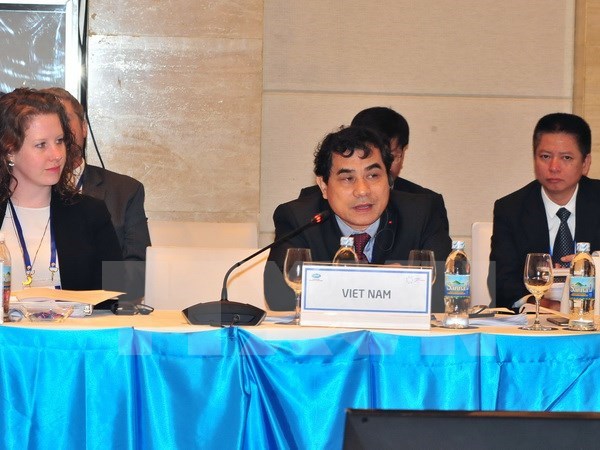From Niigata to Da Nang: APEC's stride towards food security
The Asia-Pacific Economic Cooperation (APEC) Forum is expected to gain new progress towards ensuring food security, especially when Viet Nam as host country proposed 3 initiatives regarding this issue for the APEC Year 2017.
 |
| Viet Nam delegation at the PPFS meeting in Nha Trang (Source: VNA) |
According to the United Nations, the number of people deprived of food exceeded 1 billion in 2009 for the first time.
In the context that the world population is predicted to increase to 9.6 billion in 2050 from 7.2 billion currently, global food output must rise by 70%. It will pose a big challenge in ensuring food security for the globe, including the APEC economies which make up around 40% of the world population.
The problem is even tougher for APEC as the Asia-Pacific region is prone to frequent natural disasters. Statistics show that the region suffers 70% of natural disasters and 90% of earthquakes .
Climate change, water shortage and urbanisation are also hindering agricultural production in the region.
Being aware of this challenge, APEC ministers in charge of food security gathered for the first time in Niigata, Japan, in October 2010, during which the Niigata Declaration on Food Security was approved, making it APEC’s first comprehensive plan to intensify efforts to ensure sustainable food security in the region.
The declaration stressed the importance of APEC in improving food security of the region and the globe, while pinpointing sustainable agriculture as one of the two goals for the member economies, besides facilitating investment and trade.
After the success of the first APEC Ministerial Meeting on Food Security (AMMFS) in Niigata, it has been held biennially. At each meeting, participating ministers approved new action plans on food security. Notably, within the frame work of the APEC Year 2014 in China, APEC officials adopted the APEC Food Security Roadmap towards 2020, in which the long-term goal was the attainment of a regional food system structure that can ensure lasting food security for APEC member economies as well as enhance food supply efficiency and provide more affordable food for low income consumers.
Additionally, in 2011, the APEC Policy Partnership on Food Security (PPFS) was established to strengthen public-private cooperation to address food security issues in the region.
In 2017, as the host of the APEC Year, Viet Nam chooses food security and sustainable agriculture adaptive to climate change as one of the four prioritised topics.
At the PPFS meeting held in Nha Trang City of Khanh Hoa Province in February, the country proposed three initiatives: Action plan for the APEC Strategic Framework on Rural-Urban Development to Strengthen Food Security and Quality Growth; Action plan for the APEC Programme on Food Security and Climate Change; and the Can Tho declaration on sustainable growth and food security in response to climate change.
The Ministry of Agriculture and Rural Development (MARD) also put forth 2 suggestions focusing on the development of agribusiness to support the transformation of rural labours in APEC member economies, and the impact of climate change adaptation on food security strategies.
These proposals have been applauded by participants of the meeting, said Tran Kim Long, Director of the MARD’s Department of International Cooperation, adding that they lay a foundation for upcoming APEC activities, particularly a high-level policy dialogue on food security and sustainable agriculture slated for August in the Mekong Delta city of Can Tho.
(Source: VNA)